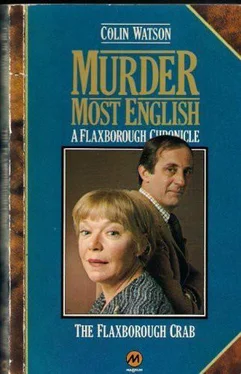Malley stopped typing and looked around.
“Didn’t I tell you who was doing the P.M., then?”
“No, you didn’t, as a matter of fact.”
“Heineman.”
“Oh,” said Purbright. He looked a fraction less carefree.
“And perhaps I didn’t mention that Winge’s family are getting both his solicitor and his own doctor to attend the inquest.”
“Solicitor....” Purbright frowned. “That wouldn’t be Justin Scorpe, would it?”
“It would.”
“And who’s the doctor?”
“Meadow.”
Love looked blandly from the inspector to the coroner’s officer.
“What’s the idea, then?”
“The family”—Malley leaned back in his chair and champed experimentally on the stem of a squat, black pipe—“are not very pleased.”
He fished a tobacco tin from the distorted breast pocket of his tunic, levered off its lid, and began ramming liquorice-like strands into the pipe bowl.
“I fancy that what they’ll be putting Meadow up to say is that the old man was suffering from something or other that caused him to be unaware of what he was doing. You know—very sad, but a sight more respectable than jumping on young women just because he felt like it.”
Love showed by a shrewd pursing of lips that he understood the logic of such strategy. He looked at the inspector.
Purbright murmured to himself: “Thompson...Heineman...Meadow...”
“They’re all doctors, you see,” Malley explained to Love.
“So what?”
“So,” said Malley, with great cheerfulness, “they all hate one another’s guts.”
Chapter Seven
The ignominious but, most citizens agreed, not undeserved end of the Flaxborough Crab was common knowledge long before the inquest was opened in the little dun-coloured courtroom adjoining the police station.
Alderman Steven Winge had been one of those public figures whose appearance on platforms, at committee tables and in chairs of jurisdiction and debate would seem to be inevitable and of limitless term. No week in the past thirty years had gone by without his having declared something open, or moved a vote of some kind, or given careful consideration to all the facts of a disturbing case.
Except in his role of magistrate, which entailed nothing but determination and sorrow, if Mr Winge’s court pronouncements were to be believed, his every duty in a lifetime’s service to the Flaxborough community had been prefaced by the assertion: ‘It gives me great pleasure...’
If bliss be a cumulative emotion, one could only assume that the waters of Gosby Reservoir had closed upon a supremely happy man.
But it was now plain to all that there had been another field of activity, private as distinct from public, that had engaged the alderman’s energies. It doubtless also had given him great pleasure. Would that day’s official inquiry in Fen Street unearth the regrettable details? Flaxborough devoutly hoped so.
The deputy coroner, Dr Thompson, took his seat at two o’clock precisely. He had been looking at his watch all morning and had spent the last half-hour lurking nervously in the corridors of the police station. Public office did not give him great pleasure; he cursed the proper holder of this particular one, Mr Albert Amblesby, as an irresponsible, cavorting, brain-softened old absentee. Which was not strictly fair, as the real coroner—admittedly senile, but in general reliably on hand—was at that moment comatose in a Cornish nursing home after falling downstairs during a visit to his married daughter in Truro.
Sergeant Malley, unhurried, efficient, kindly, stood behind Dr Thompson’s right shoulder. He held a sheaf of depositions ready to be slipped one by one in their right order before the deputy coroner as the witnesses were called.
Purbright was at the corner of the table farthest from Thompson. Next to him sat Dr Heineman, pathologist at the General Hospital. Also at the table, equidistant from Heineman and the deputy coroner, and carefully refraining from meeting the eye of either, was Dr Meadow.
The non-medical witnesses—Miss Pollock, Mrs Crunkinghorn, a fireman called Hackett, and the alderman’s widow, Mrs Olivia Winge—occupied a row of chairs beneath the room’s only window.
In a chair on his own, notebook on knee, was Henry Popplewell, of the Citizen .
At four minutes past two, a man arrived carrying a briefcase, a pile of books, and a spectacle case that might at a pinch have accommodated a brace of duelling pistols. He glanced mournfully round the court and took a place at the table opposite the deputy coroner by economically combining a deep bow with the motion of sitting down.
“Good afternoon, Mr Scorpe,” said the deputy coroner.
The solicitor gave him a small secondary bow and set about arranging his library. Then he unloaded the contents of the briefcase. Finally, he signified his readiness to allow the inquiry to proceed by donning with a flourish his huge, black-framed spectacles.
Malley leaned towards the deputy coroner’s ear.
“Perhaps you’d like to hear the doctors first, sir, so that they can get away.”
Dr Thompson agreed to the concession with prim nervousness. It was the first decision he had been called upon to make that afternoon, the first chance of trying out his voice. He thought it sounded squeaky and resolved to try for more sonority next time.
At a sign from the sergeant, Dr Heineman bounced to his feet and took the oath in a cheery, mittel-European voice. He was a man of brisk and decided manner. His short hair stood up like a brush; it and his high, eloquent eyebrows gave him an air of being the bearer of encouraging tidings. He wore a smartly cut black jacket over a pale pink pleated shirt. His bow tie was of the jaunty, pre-fabricated kind. It was bright green.
Dr Meadow absorbed these details with blank, slowly ranging eye. Then he slumped carefully in his chair and took a peep under the table. It confirmed his suspicion. The pathologist was wearing spats.
“Doctor, you conducted a post-morten examination of the body of the deceased at Flaxborough General Hospital, I understand.” The deputy coroner tried not to look at the green tie.
“Igsectly. Thet I hev done. Yes.” And off went Heineman on a rapid recital of his findings, most of which, if one were to judge by the eagerness of his tone and aspect, were eminently to his taste.
The deceased, he said, was a well-nourished male person aged about sixty. There was some evidence of circulatory deterioration, but no more than was to be expected in a man of his age. All organs were in a comparatively sound condition, and he had been unable to detect by standard pathological techniques any significant degree of physical regression attributable to the age factor.
He had been able to eliminate the possibility of intervention in the form of incision, ligature, toxin or concussion.
The deceased had ingested between six and seven ounces of protein and carbohydrate, with traces of mineral compounds, not more than one hour previous to death. No part of the contents of his stomach was inconsistent with normal nutritional processes.
The bone structure of the body appeared to be sound, apart from a healed fracture, many years old, of a bone in the left forearm.
No natural teeth survived in either the lower or the upper jaw.
He had observed a bruise, together with adjacent abrasion, minor in character, in the upper area of the left hip. There were several smaller bruises distributed over both legs. On the left shoulder was an abrasion, while on the right knee...
“Correct me if I am wrong, doctor,” broke in the deputy coroner, made daring by boredom, “but I take it that what you are listing now are the body’s superficial injuries—the incidental injuries?”
Читать дальше












